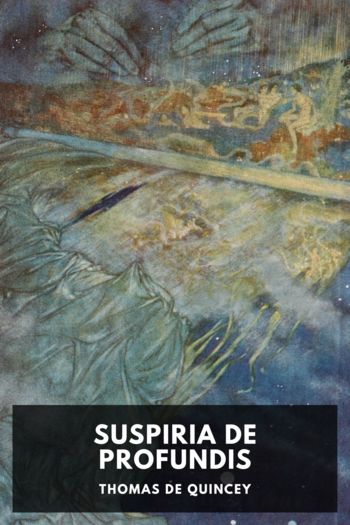Confessions of an English Opium-Eater, Thomas De Quincey [best books for students to read TXT] 📗

- Author: Thomas De Quincey
Book online «Confessions of an English Opium-Eater, Thomas De Quincey [best books for students to read TXT] 📗». Author Thomas De Quincey
So then, Oxford Street, stony-hearted stepmother! thou that listenest to the sighs of orphans and drinkest the tears of children, at length I was dismissed from thee; the time was come at last that I no more should pace in anguish thy never-ending terraces, no more should dream and wake in captivity to the pangs of hunger. Successors too many, to myself and Ann, have doubtless since then trodden in our footsteps, inheritors of our calamities; other orphans than Ann have sighed; tears have been shed by other children; and thou, Oxford Street, hast since doubtless echoed to the groans of innumerable hearts. For myself, however, the storm which I had outlived seemed to have been the pledge of a long fair-weather—the premature sufferings which I had paid down to have been accepted as a ransom for many years to come, as a price of long immunity from sorrow; and if again I walked in London a solitary and contemplative man (as oftentimes I did), I walked for the most part in serenity and peace of mind. And although it is true that the calamities of my noviciate in London had struck root so deeply in my bodily constitution, that afterwards they shot up and flourished afresh, and grew into a noxious umbrage that has overshadowed and darkened my latter years, yet these second assaults of suffering were met with a fortitude more confirmed, with the resources of a maturer intellect, and with alleviations from sympathising affection—how deep and tender!
Thus, however, with whatsoever alleviations, years that were far asunder were bound together by subtle links of suffering derived from a common root. And herein I notice an instance of the shortsightedness of human desires, that oftentimes on moonlight nights, during my first mournful abode in London, my consolation was (if such it could be thought) to gaze from Oxford Street up every avenue in succession which pierces through the heart of Marylebone to the fields and the woods; for that, said I, travelling with my eyes up the long vistas which lay part in light and part in shade, “that is the road to the North, and therefore to, and if I had the wings of a dove, that way I would fly for comfort.” Thus I said, and thus I wished, in my blindness. Yet even in that very northern region it was, even in that very valley, nay, in that very house to which my erroneous wishes pointed, that this second birth of my sufferings began, and that they again threatened to besiege the citadel of life and hope. There it was that for years I was persecuted by visions as ugly, and as ghastly phantoms as ever haunted the couch of an Orestes; and in this unhappier than he, that sleep, which comes to all as a respite and a restoration, and to him especially as a blessed7 balm for his wounded heart and his haunted brain, visited me as my bitterest scourge. Thus blind was I in my desires; yet if a veil interposes between the dim-sightedness of man and his future calamities, the same veil hides from him their alleviations, and a grief which had





Comments (0)